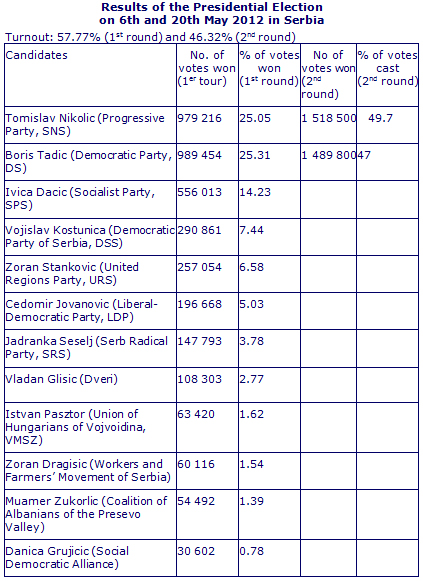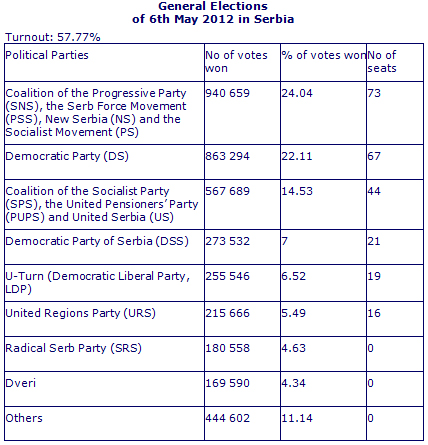Results
News
Corinne Deloy,
Fondation Robert Schuman,
Helen Levy
-

Available versions :
EN

Corinne Deloy
Fondation Robert Schuman
Helen Levy
The third time round was the right one for Tomislav Nikolic (Serb Progressive Party, SNS). With 49.7% of the vote he won the Serb presidential election, the second round of which took place on 20th May. He drew ahead of outgoing Head of State Boris Tadic (Democratic Party, DS) who won 47% of the vote, thereby failing to win a third term in office.
In the first round on 6th May last Boris Tadic took a short lead over his rival. 10,000 votes (out of a total of nearly 4 million) separated the two men: the outgoing President won 25.31% of the vote and the nationalist leader, 25.05%.
Between rounds, Tomislav Nikolic accused Boris Tadic of electoral fraud involving 500,000 votes in the first round and called on his fellow countrymen to demonstrate and denounce the theft on 12th May. "I maintain that hundreds of thousands of additional slips were printed and given to the Democratic Party and that it manipulated the result," he said. "It it time for citizens to see who they are dealing with. The Serbs do not deserve a president who is suspected of theft," he added describing the country as a "State led by criminals." All international and national observers deemed the Serb elections free and transparent, and in line with international democratic standards.
Turnout in the second round was low, totalling 46.32% - a high abstention rate that favoured Tomislav Nikolic.
"This day is the best one of my political career and of my life," declared Tomislav Nikolic who immediately insisted on reassuring his supporters and also the international community, regarding his commitment to Europe. "Serbia will stay on the path to Europe. This election has not focused on who will lead Serbia towards the European Union but on who will settle the economic problems caused by Boris Tadic's Democratic Party," he declared.
The alliance between rounds of the nationalist leader with the Democratic Party of Serbia (DSS) of former Prime Minister (2004-2008), Vojislav Kostunica, who is against Belgrades's accession to the European Union caused a stir and was used by Tadic's supporters to throw doubt over his European commitment. After the elections on 11th May 2008 Tomislav Nikolic quit the Radical Party led by Vojislav Seselj to found the Progressive Party, which says it supports Serbia integration into the European Union. Tomislav Nikolic stands as a pro-European nationalist : "We want to join the EU. It has plans for us and we shall provide input."
"Serbia has to develop its economy and do away with poverty. We must start work to rid ourselves of corruption and criminality, put an end to political oligarchy and go and look for friends in the wider world," he declared. His party's programme is putting forward tax reductions, the end of monopolies and tycoons and is announcing a reduction in corruption (which it promises will bring savings of 62 billion dinars, ie around 2% of the country's GDP). During his electoral campaign Tomislav Nikolic suggested the construction of a canal linking the Danube to the Aegean, without however explaining how he intended to implement such a project, which would necessarily involve other countries in addition to Serbia.
"I congratulate Tomislav Nikolic on his well deserved victory. I wish him every success in this extremely difficult function," declared Boris Tadic. All of the polls forecast the outgoing head of State to win by a wide margin (58% in voting intentions) just a few days before the second round. "This is an electoral earthquake, totally unexpected results," stressed political analyst Slobodan Antonic. At the end of his electoral campaign the Democratic Party leader qualified the second round as a referendum for the European Union. "It is a vital day because we are deciding on the direction we are going to take over the next five years and even for the next decade. And the world is watching us to see our degree of democratic maturity," (...) "As the former President of Serbia, if anyone is still listening to me, I exhort the upkeep of the strategy leading us to the European Union," insisted Boris Tadic.
On 9th May after the general elections the socialists, led by outgoing Interior Minister Ivica Dacic, (Socialist Party, SPS) which came third (14.53% of the vote and 44 seats) decided to continue their alliance with Boris Tadic's Democratic Party (DS) (22.11% of the vote and 67 seats). Ivica Dacic was then quoted (with that of the Mayor of Belgrade, Dragan Dilas (DS)) as being the next Prime Minister.
Before the election of Tomislav Nikolic, as President the Progressive Party, which came out ahead in the general election with 24.04% of the vote and 73 seats, was due to try and form a majority, possibly with the Socialist Party. If it does not succeed in doing this, Serbia (where the Prime Minister has more powers than the President, even though the latter can veto laws) will find itself in a situation of cohabitation.
Aged 60, Tomislav Nikolic comes from Kragujevac. He is a trained engineer and has worked for several construction companies. In 1990 he joined the People's Radical Party which, with the Serb Chetnik Movement then formed the Radical Party. In 1991 he became an MP in the National Assembly where he has been regularly re-elected. In March 1998 the Radical Party formed a coalition with the Socialist Party of the President of the Federal Republic of Yugoslavia, Slobodan Milosevic and Tomislav Nikolic became the vice-president of the Federal Yugoslav government until the fall of the dictator in October 2000.
Candidate in the Serb in 2000 Tomislav Nikolic came third behind Vojislav Kostunica and Slobodan Milosevic. In 2004, he failed in the face of Boris Tadic (45% of the vote in the second round). In 2008, the same happened: he was beaten again in the presidential election by the outgoing Head of State winning 47.97% of the vote in the second round. On 6th September he resigned from the Radical Party (of which he was interim chairman in the absence of Vojislav Seselj, accused of war crimes against the non-Serbs of Croatia, Bosnia-Herzegovina and Vojvoidina by the ICTY in The Hague) and founded the Progressive Party.
Tomislav Nikolic's obstination has paid off in the end. On 20th May he became the second president of the Serb Republic.
"The tight victory clinched by Tomislav Nikolic is not a vote of approval. Voters wanted to punish the Democratic Party. One of the ways was to vote for Tomislav Nikolic," analyses sociologist and NGO Citizens' Initiative director, Miljenko Dereta. The Serbs have indeed been severely affected by the economic crisis: low GDP growth (0.5% forecast in 2012), high unemployment (24% of the active population) and a high percentage of the population living below the poverty level. Voters have therefore expressed their lassitude and sanctioned what some might qualify as the "Tadic System". By choosing change they will possibly be forced into cohabitation. Sociologist Vladimir Vuletic fears "a serious political crisis" and talks of "the danger of tension and disagreement between the President of the Republic and the government."
 Source : Centre for free elections and democracy (CeSID)
http://www.cesid.org/
Source : Centre for free elections and democracy (CeSID)
http://www.cesid.org/
 Source : Centre for free elections and democracy (CeSID)
Source : Centre for free elections and democracy (CeSID)On the same theme
To go further
Elections in Europe
Corinne Deloy
—
4 November 2025
Elections in Europe
Corinne Deloy
—
28 October 2025
Elections in Europe
Corinne Deloy
—
14 October 2025
Elections in Europe
Corinne Deloy
—
7 October 2025

The Letter
Schuman
European news of the week
Unique in its genre, with its 200,000 subscribers and its editions in 6 languages (French, English, German, Spanish, Polish and Ukrainian), it has brought to you, for 15 years, a summary of European news, more needed now than ever
Versions :



